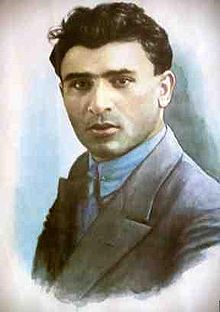Mikayil Mushfig
| Mikayil Mushfig | |
|---|---|
 |
|
| Born |
June 5, 1908 Baku |
| Died | January 6, 1938 (aged 29) Baku |
Mikayil Mushfig (Azerbaijani: Mikayıl Müşfiq, born Mikayil Ismayilzadeh) (5 June 1908, Baku – 06 January 1938, Baku) was an Azerbaijani poet of the 1930s.
Most of his poetry is about romance, nature, feelings. Despite this, he soon became one of the slandered and criticized poets in the Union of Azerbaijani Writers. Soon afterwards, Mushfig was arrested and executed by Soviet authorities at the age of 30 during the Stalinist purges in the USSR. In 1956, he was exonerated posthumously. Nikita Khrushchev era of de-stalinization has resulted in Mushfig's poetry being famous in Azerbaijani society.
Mikayil Mushfig was born in the city of Baku of Baku Governorate in 1908. He received his elementary education at Russian-language School in Baku. After the establishment of the Soviet regime in Azerbaijan in 1920, he studied at Baku Teacher's School and in 1931, he graduated from the Department of Language and Literature of the Baku State University.
Mikayil started his professional career as a school teacher. While being involved in teaching he started writing poems. His first poem Bir Gün ("The Day") was published in the Ganj fahla newspaper in Baku in 1926. At about this time, he adopted the pen name Mushfig (Perso-Arabic for "tender-hearted"). Along with Samad Vurgun and Rasul Rza, Mikayil Mushfig became one of the founders of new Azerbaijani Soviet poetic style in 1930s. He translated a number of poems from Russian as well.
In his poetry, Mushfig glorified the work of industrial workers and peasants and lauded the construction of industrial enterprises in Baku and other cities. According to Mushfig's wife, Dilbar Akhundzadeh, Mikayil welcomed the transition from the Perso-Arabic script to the Latin script that took place in Azerbaijan in 1927. His excitement was expressed in the following verse:
...
Wikipedia
